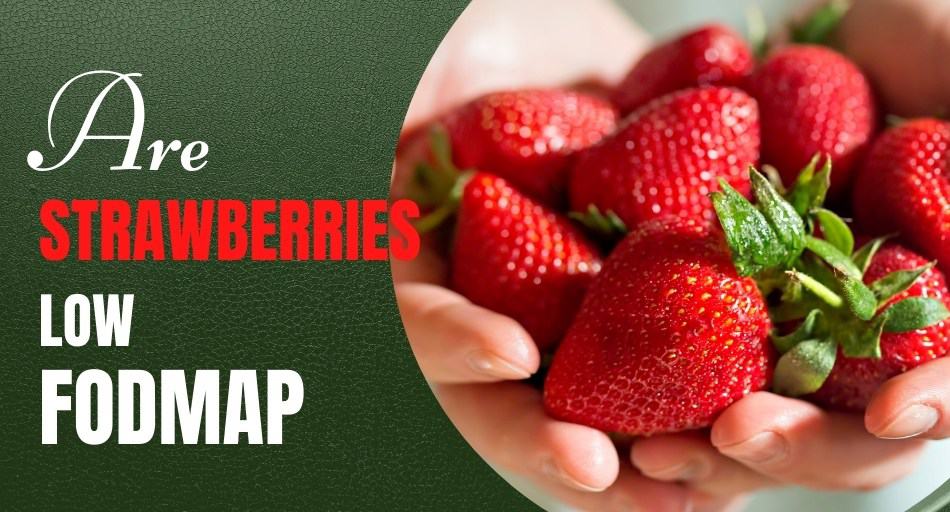A diet low in indigestible carbs often called FODMAPs, is often recommended for people struggling with irritable bowel syndrome (IBS).

This is because lowering your intake of FODMAPs can reduce the severity of the symptoms of this condition.
Unfortunately, many foods these days contain quite a large number of FODMAPs, especially when it comes to fruits. So, it’s always important to know which foods are allowed on an IBS-friendly diet.
Let’s take a look at one of the most common fruits: strawberries. Are they low or high in FODMAPs?
Table of Contents
Are Strawberries Low FODMAP?
When consumed in moderation, strawberries can be a healthy part of a diet low in FODMAPs. This fruit doesn’t contain too many indigestible carbs, so it shouldn’t trigger any IBS symptoms when eaten in small servings.
Strawberries are a great source of several nutrients as well. In particular, they contain a great dose of vitamin C, folate, potassium, and manganese.

These nutrients contribute to good health, so eating strawberries is beneficial for your overall well-being.
How low in FODMAPs are strawberries?
Just like all other fruits, strawberries need to be consumed in moderation to be classified as low-FODMAP.
For example, a serving of 10 medium-sized strawberries (around one cup or 140 grams) is suitable for people with IBS and low in FODMAPs.
It’s quite a large serving, which means that strawberries are one of the best fruits to include on a low FODMAP diet without worsening any of your digestive symptoms.
Can you eat strawberries on a low FODMAP diet?
Strawberries are a rather low-FODMAP food, so you can consume them on a diet low in these indigestible carbs.
Still, it’s important to stick to certain serving size, as eating too many in one sitting can cause some digestive problems, especially if you’re particularly sensitive to FODMAPs.

Also, make sure to consume them without cream or sugar, which can add unnecessary ingredients that do contain large amounts of FODMAPs.
Are canned strawberries low in FODMAPs?
Whether you can consume canned strawberries on a low FODMAP diet depends on how they were canned. If they have been canned in regular brine, they should be OK for people with IBS.
On the other hand, if you choose strawberries canned in a heavy syrup, you’ll be consuming a lot of FODMAPs, which is bad for the symptoms of IBS. So, keep that in mind when choosing your canned fruits.
Is strawberry juice low in FODMAPs?
As a result, all fruit juices contain excess fructose and polyols, which are considered FODMAPs. So, experts recommend avoiding them on a low FODMAP diet and for those who are particularly sensitive to these indigestible carbs.

Some people might be OK with drinking some strawberry juice, especially if you dilute it with some water. But start off with small portions to avoid any adverse side effects.
Are strawberries good for you?
Strawberries are very nutritious and actually not too high in calories. They’re also a great source of nutrients like fiber.
A one-cup serving of strawberries provides you with 2.9 grams of fiber, which is around 12% of your daily need for this nutrient.
The fiber in strawberries helps prevent indigestion by helping food pass through your digestive tract.
It also contributes to the feeling of fullness, reducing how many calories you’re ingesting in a single sitting. So, eating strawberries can also help you lose weight.
What’s more, just one cup of fresh strawberries provides you with 141% of your daily recommended need for vitamin C.
This micronutrient, also called ascorbic acid, is crucial for the growth, development, and repair of all the tissues in your body.
Vitamin C also contributes to iron absorption and keeping your digestive system healthy. So, by getting a lot of vitamin C-rich foods, you can help your body fight against viral infections.
Strawberries are also packed with manganese, a mineral that helps your body form connective tissues, blood-clotting factors, and bones. It’s also crucial for the health of your brain and nerve function.

So, it’s important to get it from your diet.
Strawberries also contain quite a lot of folate, also known as vitamin B9. This micronutrient is important for normal tissue growth and cell function.
It’s also fundamental for the healthy development and growth of the fetus That’s why, pregnant women should consume a lot of folate-rich foods.
Potassium is also found in large quantities in fresh strawberries. In fact, a single serving of strawberries contains as much as 233 mg of this mineral.
Potassium is important for fluid level regulation in your body and preventing dehydration. It also helps offset the negative effects of sodium on your blood pressure. So, it lowers it, reducing your risk of strokes and heart attacks.
Aside from nutrients, strawberries are an excellent source of antioxidants. These plant compounds help flush out free radicals from your body, preventing oxidative stress and damage to your cells.
Thanks to that, you’re less likely to develop various chronic conditions like diabetes, cancer, heart disease, and chronic inflammation.
Strawberries also contain other plant compounds with numerous other health benefits.
According to some studies, regularly eating strawberries improves your cholesterol levels, reducing your risk of various cardiovascular conditions.
Other research shows that they have blood sugar levels-lowering properties, which can reduce your risk of obesity and type 2 diabetes.
So, even though strawberries contain sugars, they don’t cause spikes in your blood sugar levels.
Aside from all these health benefits, some people might be allergic to strawberries.

Symptoms of a strawberry allergy include swelling of the lips, face, tongue, and throat, as well breathing problems if you’re particularly allergic.
So, if you know you suffer from a strawberry allergy, make sure to avoid this fruit.
Conclusion
In moderation, eating strawberries is allowed on a low FODMAP diet. This fruit is rather low in indigestible carbs, so you can safely consume them without triggering any IBS symptoms.
Strawberries are also a great source of various vitamins and minerals as well as antioxidants that lower your risk of various health conditions. So, including some strawberries in your diet can be very good for you.
Sources: Nutrition Data, National Library of Medicine, and PMC
